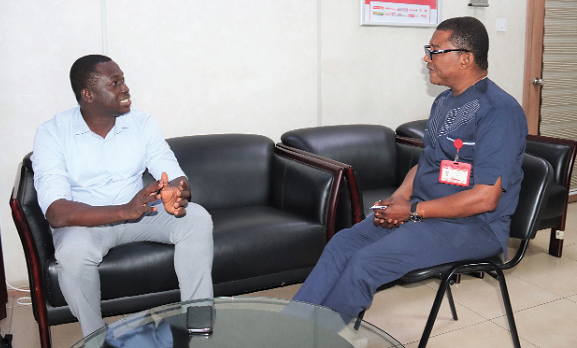The Chief Executive Officer (CEO) of Commodity Monitor Ltd, Stephen Yeboah, has called for the application of efficient and appropriate technology in the small-scale mining sector to promote responsible mining.
He said small-scale mining was not bad, but the irresponsible manner in which some miners carried out their activities, the unbridled use of mercury, directing tailings into river bodies and mounting machinery, such as Chanfans, into river bodies needed to be reviewed.
“I am actually for mining, basically because I know mining can be a substantial economic boost to the rural and national economies, except that the way it is done is the issue,” Mr Yeboah said when he paid a courtesy called on the Editor, Graphic, Kobby Asmah, last Wednesday to engage him on how to collaborate to support the fight against illegal small-scale mining, popularly known as galamsey.
The development planner and consultant said the use of mercury by illegal small-scale miners polluted the environment and posed serious health threats, foremost to the individuals in artisanal gold mining communities.
Context
A recent study conducted by the Chemistry Department of the Kwame Nkrumah University of Science and Technology and the Aarhus University, Denmark concluded that inhabitants of Gbani, a mining community in the Upper East Region, were at risk of the non-cancer effects of mercury.
Studies have also found that extended exposure to mercury can cause mercury poisoning and damage to the kidneys and impair hearing, vision and balance.
Miners who come into direct contact with mercury during gold extraction inhale mercury vapour, putting them at a higher risk.
Through the use of contaminated soil and water for livestock and crops, mercury can also enter the food chain, leaving communities near artisanal mining sites at risk of accumulating mercury in their bodies, which is particularly dangerous for pregnant women, children and the elderly.
Solution
Speaking on the issue, Mr Yeboah explained that most miners in the country had a strong affinity to the use of mercury, the reason Commodity Monitor decided to intervene by providing mercury-free equipment to help solve the problem of irresponsible mining.
Known as Gold Katcha, the equipment, which was introduced by Commodity Monitor to the Ghanaian market, is said to be more efficient than Chanfan, as it recovers up to 90 per cent of gold from the ore, against the average of 35 per cent recovery that small-scale miners record.
The equipment, among others, does scrubbing, crushing and milling at the same time as the concentrator washes the ore and recovers both fine and coarse gold.
Aside from that, the equipment – approved and procured by the government for small-scale and community mining programmes – is also used for mercury remediation.
“I believe if we are able to get the technology right, that can be a very big boost to the fight against galamsey,” Mr Yeboah, who has done extensive research and also written about natural resource governance, said.
“And that is why we are bringing in this narrative to change the status quo to ensure that mining is done in a responsible way,” he added.
Local production
He disclosed that the Gold Katcha, currently sourced from South Africa, would be produced in the country by the first quarter of next year.
Currently, he said, over 50 machines had been deployed in mining communities such as Wa, Bongo, Tarkwa, among others.
Asked by the Editor how we could do away with illegal mining and promote responsible mining, Mr Yeboah said it would require a concerted effort by the government, the media, mining firms, chiefs and all stakeholders in the sector.
Ensuring responsible mining, he added, would create an avenue for more Ghanaians to venture into the mining sector, which is currently dominated by foreigners.
That, he noted, would help boost other sectors of the economy.
Assurance
For his part, Mr Asmah expressed joy at the collaboration Commodity Monitor was seeking to give a boost to the fight against illegal mining.
He said the story on illegal mining had been widely told by the media, but the manner in which mercury was used and its subsequent impact on living organisms had not been told adequately.
Mr Asmah assured the leadership of Commodity Monitor of the commitment of the Graphic Communications Group to inform and educate the public on the canker in order to trigger a positive change.

